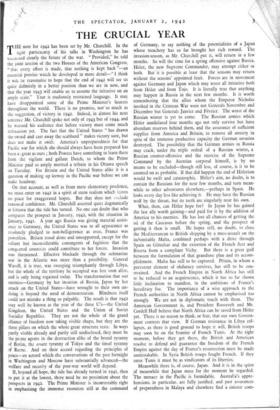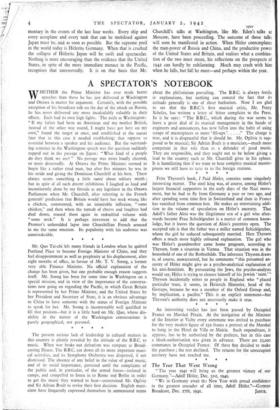THE CRUCIAL YEAR
THE note for 1942 has been set by Mr. Churchill. In the tight particuiariy of his talks in Washington he has visuaiised clearly the future of the war. " Provided," he told the joint session of the two Houses of the American Congress; " that every effort is made, that nothing is kept back "—an essential proviso which he developed in more detail—" I think it will be reasonable to hope that the end of 1942 will see us quite definitely in a better position than we are in now, and that the year 1943 will enable us to assume the initiative on an ample scale." Tnat is studiously restrained language. It may have disappointed some of the Prime Minister's hearers throughout the world. There is no promise, nor' so much as the suggestion, of victory in 1942. Indeed, in almost his next sentence Mr. Churchill spoke not only of 1943 but of 1944, and he warned his audience that before victory must come much tribulation yet. The fact that the United States " has drawn the sword and cast away the scabbard " makes victory sure, but does not make it swift. America's unpreparedness for that Pacific war for which she should always have been prepared has been a., great as ours ; both Powers have something to learn there from the vigilant and gallant Dutch, to whom the Prime Minister paid so amply merited a tribute in his Ottawa speech on Tuesday. For Britain and the United States alike it is a question of making up leeway in the Pacific war before we can make headway.
On that account, as well as from mere elementary prudence, we must enter on 1942 in a spirit of stern realism which leaves no place for exaggerated hopes. But that does not exclude reasoned confidence. Mr. Churchill asserted quite dogmatically at Ottawa that the tide has turned. No one can doubt that who compares the prospect in January, 1942, with the situation in January, 1941. A year ago Russia was giving material assist- ance to Germany, the .United States was to all appearance as resolutely pledged to non-belligerence as ever, France was powerless. Britain stood alone and unsupported, except for the valiant but inconsiderable contingents of fugitives that the conquered countries could contribute to her forces. Invasion was threatened. Effective blockade through the submarine war in the Atlantic was more than a possibility. General Wavell, it is true, was sweeping triumphantly through Libya, but the whole of the territory he occupied was lost soon after, and is only being regained today. The transformation that our enemies--Germany by her invasion of Russia, Japan by her attack on the United States—have wrought to their own un- doing is beyond the need of demonstration. Blindness itself could not mistake a thing so palpable. The result is that 1942 may well be known as the year of the three U's—the United Kingdom, the United States and the Union of Soviet Socialist Republics. They are not the whole of the grand alliance of freedom now taking visible shape, but they are the three pillars on which the whole great structure rests.- In ways partly visible already and partly still undisclosed, they must be the prime agents in the destruction alike of the brutal tyranny of Berlin, the ersatz tyranny of Tokyo and the tinsel tyranny of Rome. And on their accord regarding the principles of peace—an accord which .the conversations of the past fortnight in. Washington and Moscow have substantially advanced—the welfare and security of the post-war world will depend.
If, beyond all hope, the tide has already turned in 1941, then to put it at the lowest, there need be no pessimism about the prospects in 1942. The Prime Minister is incontestably right in emphasising the immense resources still at the command of Germany, to say nothing of the potentialities of a Japan whose treachery has so far brought her rich reward. The invasion-season, as Mr. Churchill put it, will return in a few months. So will the time for a spring offensive against Russia. Hitler, the new Supreme Commander, may attempt either or both. But, it is possible at least that the seasons may return without the seasons' appointed fruit. Forces are in movement against Germany and Japan which may wrest all initiative both from Hitler and from Tojo. It is literally true that anything may happen in Russia in the next few months. It is worth remembering that the allies whom the Emperor Nicholas invoked in the Crimean War were not Generals Novembre and Decembre but Generals Janvier and Fevrier. The worst of the Russian winter is yet to come. The Russian armies which Hitler annihilated four months ago not only survive but have abundant reserves behind them, and the assurance of sufficient supplies from America and Britain, to remove all anxiety in spite of the immense productive capacity the German invasion destroyed. The possibility that the German armies in Russia may crack, under the triple ordeal of a Russian winter, a Russian counter-offensive and the exercise of the Supreme Command by the Austrian corporal himself, is by no means to be excluded—though still less, of course, is it to be counted on as probable. If that did happen the end of Hitlerism would be swift and catastrophic. Hitler's aim, no doubt, is to contain the Russians for the next few months, and turn mean- while to other adventures elsewhere,—perhaps in Spain. He looks every day less like achieving it. He may have the Russian wolf by the throat, but its teeth are singularly near his own.
What, then, can Hitler hope for? In Japan he has gained the last ally worth gaining—and paid for it by the addition of America to his enemies. He has lost all chances of getting the oil of the Caucasus before the spring, and the prospect of getting it then is small. He hopes still, no doubt, to close the Mediterranean to British shipping by a mass-assault on the indomitable Malta, combined perhaps with a drive through Spain on Gibraltar and the extortion of the French fleet and Biserta from a compliant Vichy. But there is a great gulf between the formulation of that grandiose plan and its accom- plishment. Malta has still to be captured. Petain, in whom a persistent element of obduracy survives, has still to be con- strained. And the French Empire in North Africa has still to be reduced to an acquiescence, which it has so far shown little inclination to manifest, in the ambitions of France's hereditary foe. The importance of a wise approach to the French authorities in North Africa cannot be emphasised too strongly. We are not in diplomatic touch with them. The American Government is, and President Roosevelt and Mr.
Cordell Hull believe that North Africa can be saved from Hitler yet. There is no reason to think, or fear, that our own Govern- ment contests that view. If German resistance in Libya col- lapses, as there is good ground to hope it will, British troops may soon be on the frontier of French Tunis. At the right moment, before they get there, the British and American resolve to defend and guarantee the freedom of the French Empire against the day of France's resurrection must be made unmistakable. In Syria British troops fought French. If they enter Tunis it must be as vindicators of its liberties.
Meanwhile there is, of course, Japan. And it is in the spirit of meanwhile that Japan must for the moment be regarded. The menace in the Pacific is formidable. Australia's appre- hensions, in particular, are fully justified, and past assurances of preparedness in Malaya and elsewhere find a sinister com- mentary in the events of the last four weeks. Every ship and every aeroplane and every tank that can be mobilised against Japan must be, and as soon as possible. But the supreme peril in the world today is Hitlerite Germany. When that is crushed the collapse of Hitlerite Japan will be swift and spectacular. Nothing is more encouraging than the evidence that the United States, in spite of the more immediate menace in the Pacific, recognises that unreservedly. It is on that basis that Mr. Churchill's talks at Washington, like Mr. Eden's talks at Moscow, have been proceeding. The outcome of those talks will soon be manifested in action. When Hitler contemplates the man-power of Russia and China, and the productive power of the United States and Britain, and 'realises what a combina- tion of the two must mean, his reflections on the prospects of 1942 can hardly be exhilarating. Much may crash with him when he falls, but fall he must—and perhaps within the year.



























 Previous page
Previous page